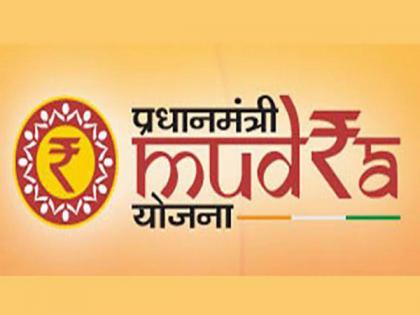SBI Research highlights how PMMY revolutionised socio-cultural fabric of nation in a short span
By ANI | Published: April 27, 2023 11:41 PM2023-04-27T23:41:15+5:302023-04-27T23:45:02+5:30
New Delhi [India], April 27 : SBI Research in a report said Prime Minister Mudra Yojana or MUDRA brought ...

SBI Research highlights how PMMY revolutionised socio-cultural fabric of nation in a short span
New Delhi [India], April 27 : SBI Research in a report said Prime Minister Mudra Yojana or MUDRA brought forth "a leap of faith inculcating robust credit dispensation among member lending institutions (MLIs)".
The report, which was released on Thursday, said, "In a brief span of eight years, Prime Minister Mudra Yojana or MUDRA has brought forth a leap of faith inculcating robust credit dispensation among MLIs (member lending institutions) while fostering superior credit culture among diversified credit seeker groups, chiefly from the bottom strata that had remained unserved for a long tenor, thus being an efficient vector for 'uniform credit at population scale'!"
According to SBI Research, MUDRA has created an indelible print on India's rising micro, small and medium enterprises' (MSME) prowess through relentless promoting by a wide array of MLIs which are scheduled commercial banks (SCBs), non-banking finance compes (NBFCs), regional rural banks (RRBs), microfinance Institutions (MFIs) to meet credit needs of the hitherto fringe sections.
The report said credit saturation of hitherto 'thin credit file' customers with little or NIL-credit history has provided a credible data moat to lenders and policymakers, enabling them to craft better-calibrated financial offerings to vulnerable groups. A thin credit file generally refers to a credit history with fewer than five credit accounts.
"Empowering the grassroot level has been one of the most remarkable feat of the MUDRA scheme," SBI Research said, adding, "Our research shows analysing total disbursement under the scheme since its launch which showcases that the unique selling proposition of PMMY has been well received by diversified intended beneficiary classes, rising the economic clout of the bottom and ensuring equitable redistribution of resources and efficiently embedding resultant prosperity uniformly."
Having successfully weathered the pandemic blunt in both disbursal as also number of accounts, it said, "MUDRA now appears destined for higher glories benefiting the social fabric of the country through bringing financial freedom to fringe groups of women, Minorities, Scheduled Castes (SCs), Scheduled Tribes (STs), Other Backward Classes (OBCs) as also fuelling new age entrepreneurship across manufacturing or services or trade.
At the macro level, India's Social Fabric Index or SFI, which represents the participation and celebration of underprivileged in the formal banking system shows 3.2 times jump for the 5-year period ended FY22, SBI Research said.
At Micro Level, SBI Research created this index India's Mudra Atmrbhar Quotient or MAQ defined as the propensity of particular social strata to repay based purely on cashflow generated from a business, thus capturing his/ her becoming Atmrbhar over the life cycle of the product.
The MAQ was estimated by adjusting for the following factors: The propensity of repayment capability for different social segments and the traction in repayments for a class of borrowers for each social strata.
The repayment capability for each social strata is adjusted by the number of accounts for that particular strata. This is to ensure that the MAQ captures different stages of the life cycle growth of the Mudra beneficiary from Shishu to Tarun products and hence the Atmrbhata in being an entrepreneur.
Shishu is the most widely availed Mudra product across all social segments except Mudra Card, where the number of accounts is evenly distributed with a major focus towards Kishore product.
With regard to disbursements, the highest disbursement is in Shishu product in the hitherto fringe social segments of SC, ST, OBC, Women etc. Disbursements to Minorities are higher in Kishore Product than Tarun product, according to SBI Research.
SBI Research said it believes that increasing women's participation in PMMY leads to a better financial situation for women borrowers. In the last six years (FY22 over FY16) while per woman, PMMY disbursement amount increased by a compound annual growth rate (CAGR) of 11 per cent to Rs 42,791, the per woman incremental deposits increased by a CAGR of 10.7 per cent to Rs 61,476, it added.
Thus, PMMY is an effective power tool for women's empowerment at the grassroots level.
The SBI Research said Mudra Atmrbhar Quotient has increased from 0.81 for SC and ST in FY16 to 2.20 and 2.02 in FY22, respectively, while for OBCs, it has increased from 0.82 to 1.98.
"For Minorities, it has increased from 0.99 to 2.71 while for women entrepreneurs, it has increased from 0.82 to 2.28 in FY22," the report said.
Regarding disbursements, SBI Research said the highest disbursement is in Shishu product in the hitherto fringe social segments of SCs, STs, OBCs, Women and Minorities. Disbursements to Minorities are the highest in the Kishore variant across all social strata.
It added increasing women's participation in PMMY leads to better financial situation of women borrowers, reinforcing our belief that PMMY is an effective power tool for women empowerment at grass-roots level.
Disclaimer: This post has been auto-published from an agency feed without any modifications to the text and has not been reviewed by an editor
Open in app